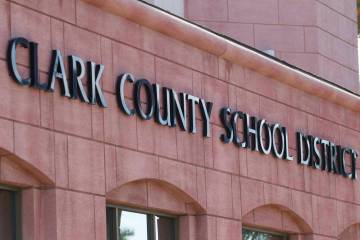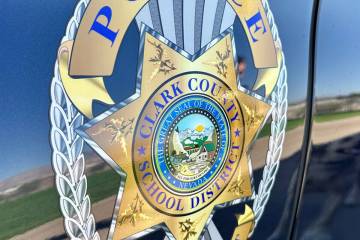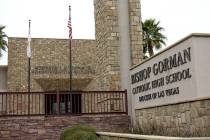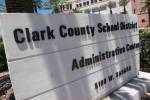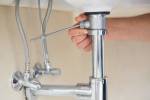National study rates Nevada teacher education programs low
Teacher preparation programs in Nevada are not adequately training the next generation of educators, according to a national study that reviewed more than 1,000 programs and was released Tuesday.
While some state education leaders say they take the study seriously, others believe the review was flawed and lacks credibility. Programs at the state’s colleges and universities received low ratings, with the two highest earning one and a half out of four stars, according to the study conducted by the National Council on Teacher Quality.
Those ratings are not unique to programs in Nevada and are consistent with those of programs across the country. Most programs earned anywhere from zero to two stars, said Kate Walsh, president of the National Council on Teacher Quality. Only four programs, all in secondary education, earned four stars, the study shows. They were at South Carolina’s Furman University, Tennessee’s Lipscomb University, Ohio State University and Tennessee’s Vanderbilt University.
“A program’s low rating does not suggest that many of its graduates don’t go on to become capable teachers,” the study found.
Based in Washington, D.C., the National Council on Teacher Quality advocates for reform in a broad range of teacher policies nationally and at the state level.
The organization’s review is a scathing assessment of colleges’ education programs and their admission standards, training and value. “It’s unfortunately far too easy in the United States to get into a teacher preparation program,” Walsh told reporters during a conference call Tuesday.
Spencer Stewart, vice president of college relations at Nevada State College, said college officials take this report seriously. Similar reports have been released over the last couple of years, all with the same message: There’s room for improvement within teacher preparation programs and among the graduates they produce.
College officials have agreed with the general assessment, Stewart said. “It’s always good to have a third party perspective on how we are doing,” he said.
The college has made strides toward overall improvement, Stewart said. NSC’s undergraduate elementary teacher preparation program received an overall rating of zero stars, the study shows.
Its undergraduate secondary teacher preparation program received one star.
Emily Lin, director of teacher education at the University of Nevada, Las Vegas, said the report is flawed and lacks credibility because the ratings were based on impartial and inaccurate data.
“You can’t really trust the report because they don’t show the criteria that they used to come to the ratings,” she said. “It’s incomplete. “
To reach their conclusions, the investigators requested information from education programs, such as admission requirements, course syllabi, textbooks and graduate surveys. They did not visit programs, interview students or speak with school officials who hired graduates.
UNLV’s undergraduate elementary teacher preparation program received one star, the study shows. Its undergraduate secondary teacher preparation program received one and a half stars.
Its graduate elementary program received one star and its graduate secondary and graduate special education programs received an overall rating of zero stars, the study shows.
Lin said the ratings don’t accurately represent the kind of training students receive in those programs.
“We ... produce really strong special ed and early education teachers,” Lin said, who is also the president of the Nevada Association of Colleges for Teacher Education.
The vast majority of the students who graduate from UNLV’s programs and stay in Nevada, get hired, Lin said.
Amanda Fulkerson, spokeswoman for the Clark County School District, said the district recruits and retains the most effective teachers. “Those teachers come from all over the country,” she said in a prepared statement. “We also know new teachers need support and continued professional development to succeed — especially within diverse populations like we have here in Clark County where the majority of our educators face unique urban challenges and high class sizes.”
The district on Tuesday was not able to provide the percentage of teachers it hires from Nevada’s colleges and universities.
The University of Nevada, Reno’s graduate elementary teacher preparation program received one and a half stars. Its graduate secondary program received an overall rating of zero stars, the study shows.
Chris Cheney, dean of the college of education at the University of Nevada, Reno, wasn’t available to comment Tuesday. However, in a message she sent to faculty and staff Tuesday regarding the study, she said, “NCTQ based ratings of programs on reviews of selected syllabi and used only this limited “input” data in their analyses.”
Still, she said the study can start a conversation around the programs at the institution.
“Obviously, we are always interested in constructive criticism that will help us improve our programs,” she wrote. “Despite the flaws of the study ... the NCTQ report may be a stimulus for fruitful discussions of our programs, our goals, and how we hope to achieve them.”
Lynn Warne, president of the Nevada State Education Association, said she wasn’t surprised by the low ratings of the programs at the state’s colleges and universities.
There’s not enough funding going to the institutions and the quality of the programs won’t change unless the state invests more money in them, she said. “The priorities of this state have not been in education.”
At schools that did not cooperate, investigators asked students, bookstores and professors to share their course documents, reading lists and policies. In some cases, the council filed lawsuits to collect those documents.
The researchers spent an average of 40 hours in grading each education program.
The Associated Press contributed to this report.
Contact Yesenia Amaro at yamaro@reviewjournal.com or 702-383-0440.




